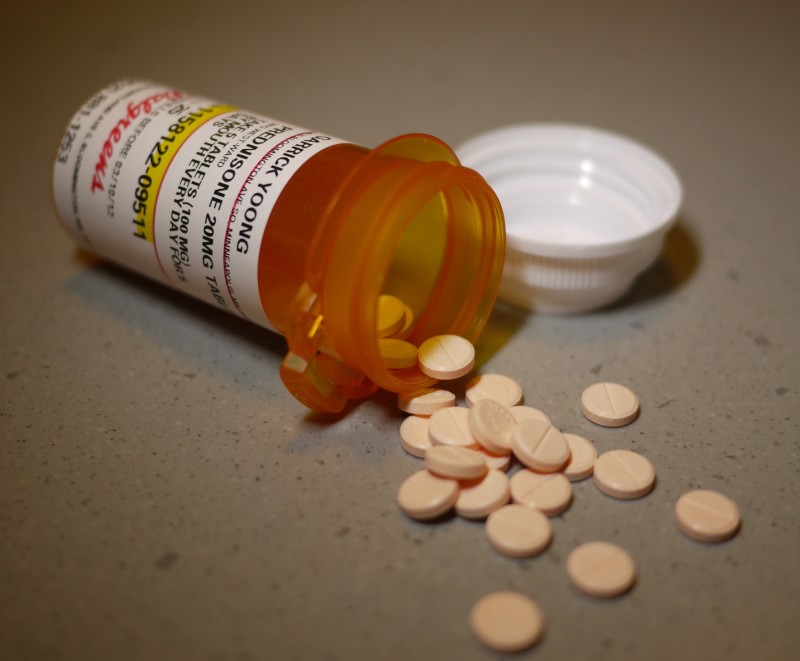In the trial, 269 adults, all suffering from sciatica for less than three months, received either a placebo or a course of prednisone, an oral steroid, for two weeks. Then researchers assessed the study participants’ function and pain at three weeks and one year later.
All participants showed improvement, but those in the prednisone group experienced slightly better function. Both groups had the same level of pain relief. The study, funded by the National Institutes of Health, was published Tuesday in the journal JAMA.
“Sometimes treating a condition with medication actually leads to improvements in pain and function,” Goldberg said. “Other times, however, simply letting time pass leads to improvement on its own.”
Letting that time pass without prednisone may mean eventually feeling better without suffering the side effects of oral steroids.
Most side effects from steroids are mild, short-term and well-tolerated, Goldberg said, but they can include agitation, insomnia, tremors, gastritis, headaches and, for diabetics, increased blood sugar. Other treatment options include non-steroidal anti-inflammatories or other medications, epidural steroids, surgery or even no treatment at all.
“Now we have good evidence, and now we can have a better discussion about what’s appropriate for a particular patient and weigh whether a little bit of improvement in function is worth the risk of a steroid,” Goldberg said.
The findings echo what has been found with other interventions for sciatica. Clinicians previously believed the direct compression on the nerve root by a herniated disk caused the pain, so surgery was a common treatment option, Goldberg said.
While studies have shown that surgery for a herniated disk does lead to immediate short-term relief, patients’ pain is no different a year later than that of patients who didn’t receive surgery.
The results also explain the push in recent years to test more and more treatments previously regarded as standard practice.
“Many interventions we use in clinical medicine today are there primarily because of traditional and long-term use, not because they have a solid evidence base to justify their use in the clinical setting,” said the study’s senior author, Dr. Andrew L. Avins, a research scientist at the Kaiser Permanente Northern California Division of Research.
So there's been increasing interest in testing such beliefs with randomized-controlled trial, the gold standard of medical study. “We do find that many therapies in which we’ve placed great trust over the years actually have very little benefit for patients, compared to a placebo,” Avins said.
What these findings mean for individual patients, however, will depend on the patients themselves and their doctors.
“This result, most practitioners will probably tell you, is surprising,” said Dr. Gowriharan Thaiyananthan, a neurosurgeon and founder of the Brain and Spine Institute of California in Newport Beach. “Often evidence-based medicine is not practiced because the evidence has not been established yet. The hope is that physicians will be cognizant and dynamic enough to incorporate new evidence into changing their practice habits appropriately.”
But these findings don’t necessarily take oral steroids off the table as a treatment option. It just means the risk-benefit calculation changes as patients weigh their options, Thaiyananthan said. “Modest improvements in patients with no contraindications for steroid use may suffice to treat these patients with steroids,” he said, or clinicians may discuss other treatments options with patients.
Meanwhile, this research adds to the trend of finding out whether what was thought to be true about a particular treatment or condition, actually is true.
“This is a great example of the dangers of practicing 'anecdotal medicine.' For years, we’ve been giving oral steroids because we see many of our patients get so much better so quickly when we do it, and we pat ourselves on the back for being such great clinicians offering great therapies, and patients believe in what we do,” Avins said.
“Now what we’ve discovered is that mostly what we’re watching is the natural course of the condition, maybe with some element of placebo effect as well,” he continued. “And the great benefit of this kind of study is to finally give patients and their providers some hard evidence with which they can now have an informed decision about whether it makes sense to try oral steroids as an option.”
